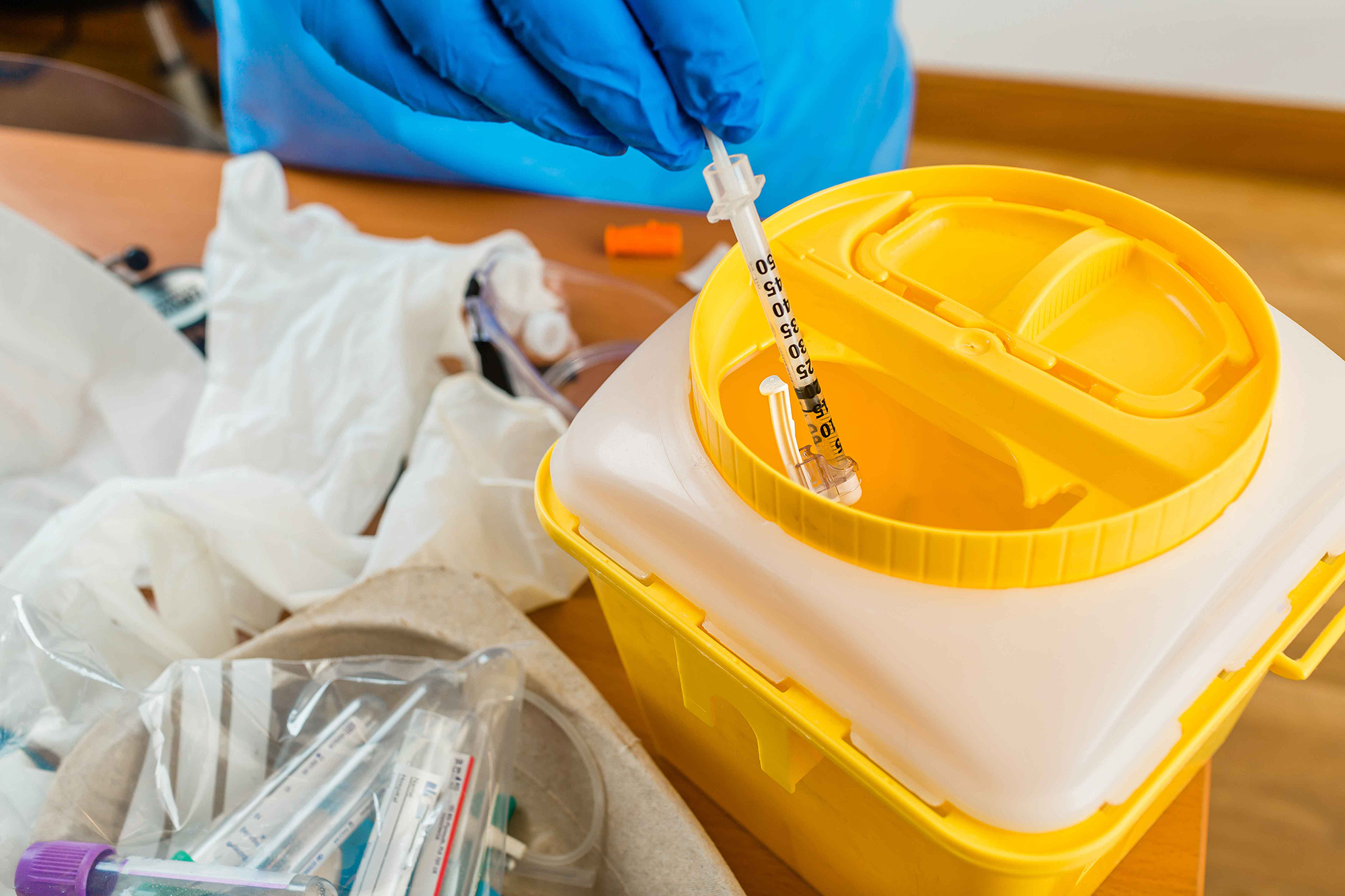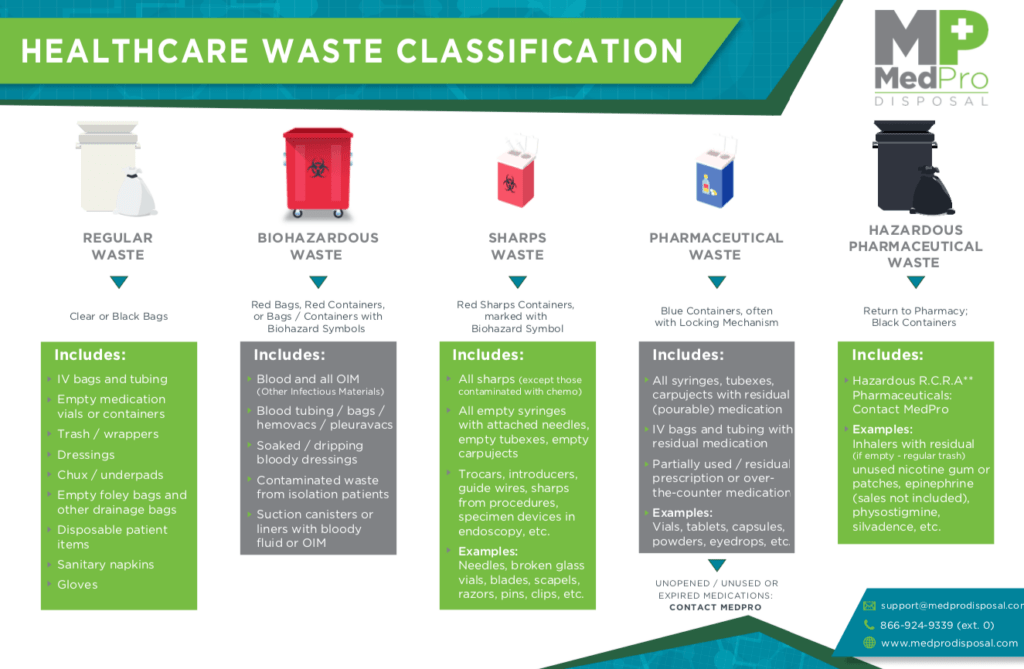Strategic Medical Waste Disposal Solutions: Promoting Safety And Security and Sustainability
Proper Disposal Strategies for Clinical Waste
Appropriate disposal techniques for medical waste are of utmost relevance in ensuring the safety of both healthcare employees and the basic public. The proper handling and disposal of clinical waste is vital to stop the spread of contagious diseases and the contamination of the setting. This introduction will explore the significance of correct clinical waste disposal, offer guidelines for taking care of various types of waste, and stress the need for health care facilities to take on finest practices.
Importance of Correct Medical Garbage Disposal
Appropriate clinical waste disposal is of utmost relevance in order to stop the spread of infections and protect public wellness. Medical waste describes any waste created during clinical procedures or from the health care sector. This waste can include transmittable materials, such as blood or physical fluids, sharps, pharmaceuticals, and various other potentially harmful substances. Otherwise taken care of correctly, clinical waste can pose severe risks to health care workers, people, and the public.
One of the main reasons for appropriate medical waste disposal is to avoid the spread of infections. By safely disposing of medical waste, the chances of direct exposure to these virus are dramatically lowered, making certain the safety and security of medical care employees, clients, and the neighborhood at large.
Moreover, correct medical waste disposal is vital for shielding public health and wellness. By following proper disposal methods, such as therapy, segregation, and containment, we can decrease the prospective dangers linked with medical waste and secure the health of the community.
Handling and Disposing of Sharps
When it involves the handling and disposal of sharps, adherence to proper procedures is essential for making certain the safety of health care employees and avoiding the threat of injury or infection. Sharps include needles, syringes, lancets, and various other items with the prospective to penetrate or cut the skin. As a result of their potential to send bloodborne pathogens, such as HIV and hepatitis B and C, it is vital to handle and dispose of sharps appropriately.

Disposal of sharps containers ought to adhere to regional laws and standards. It is best to use qualified medical waste disposal solutions that specialize in the proper handling and disposal of sharps to make sure compliance with guidelines and minimize dangers to medical care workers and the setting.
Guidelines for Contagious Garbage Disposal
Contagious waste, likewise understood as biohazardous or biomedical waste, refers to products that are possibly infected with contagious representatives or various other harmful materials. Correct disposal of transmittable waste is critical to make certain the safety and security and health of medical care employees, people, and the basic public.
The standards for transmittable garbage disposal differ relying on the nation and neighborhood regulations, but there are some typical methods that medical care centers should comply with. First of all, all contagious waste needs to be segregated from various other kinds of waste at the factor of generation. This assists prevent cross-contamination and guarantees that the waste can be handled suitably. Infectious waste should be saved in leak-proof, puncture-resistant containers that are clearly classified with the biohazard sign. These containers should be maintained closed when not being used to decrease the danger of exposure. Last but not least, contagious waste should be carried and gotten rid of by certified waste monitoring business that concentrate on taking care of biomedical waste.
It is essential for healthcare facilities to have detailed training programs in area to educate staff on the appropriate treatments for transmittable waste disposal. This consists of training on waste partition, storage space, and taking care of methods. By complying with these standards, medical care centers can effectively manage contagious waste, decrease the danger of infections, and safeguard public health.
Ideal Practices for Pharmaceutical Garbage Disposal
Pharmaceutical waste disposal must always be performed on a regular basis and according to specialist standards. Correct management of pharmaceutical waste is vital to protect public health and wellness and the atmosphere. Pharmaceuticals can position a considerable danger if not gotten rid of properly, as they may contaminate water sources, injury marine life, or perhaps add to the advancement of antibiotic resistance.
One of the most effective practices for pharmaceutical garbage disposal is to develop an assigned collection system within health care facilities. medical waste removal. This system needs to consist of separate containers for different kinds of pharmaceutical waste, such as ended medicines, unused drugs, and infected products. These containers ought to be clearly classified and found in quickly accessible locations to urge appropriate disposal by health care professionals
Furthermore, it is crucial to enlighten healthcare personnel about the proper handling and disposal of pharmaceutical waste. Training programs should concentrate on identifying different types of pharmaceutical waste, understanding the associated dangers, and complying with the proper disposal procedures. Normal suggestions and updates must be provided to make certain compliance with disposal guidelines.
In enhancement to inner practices, healthcare centers ought to additionally establish collaborations with accredited waste management business. These firms specialize in the collection, transport, and disposal of pharmaceutical waste. By collaborating with these specialists, healthcare facilities can guarantee that their pharmaceutical waste is gotten rid of securely and in compliance with regional laws.
Compliance With Legal Laws
In order to make sure compliance with lawful regulations, it is imperative for health care facilities to comply with correct disposal methods for clinical waste. Medical waste presents a significant danger to public health and the atmosphere, making it crucial for health care centers to get rid of and handle of it in conformity with the regulation.
Regulatory bodies, such as the Occupational Security and Wellness Administration (OSHA) and the Environmental Security Firm (EPA), have actually established guidelines and needs for the proper disposal of medical waste - WasteX Medical Waste Disposal. These laws intend to protect healthcare workers, waste administration workers, and the public from possible threats related to medical waste

Non-compliance with lawful guidelines can lead to serious consequences for healthcare centers, consisting of fines, legal liabilities, damage to reputation, and potential injury to public health and wellness. As a result, it is crucial for health care facilities to remain updated with the most up to date policies and continually display and enhance their waste management techniques.
Final Thought
Adhering to guidelines for disposing and managing of sharps, infectious waste, and pharmaceutical waste is vital. It is crucial that health care facilities maintain strict protocols for the correct disposal of medical waste to lessen risks and preserve a risk-free medical care environment.
Medical waste refers to any type of waste produced throughout clinical treatments or from the medical care industry. Infectious waste, also understood as biohazardous or biomedical waste, refers to materials that are potentially polluted with contagious representatives or various other hazardous materials. All transmittable waste needs to be set apart from various other kinds of waste at the factor of generation. Transmittable waste needs to be transferred and disposed of by accredited waste management companies that specialize in dealing with biomedical waste.
Adhering to guidelines for dealing with and disposing of sharps, infectious waste, and pharmaceutical waste is essential. (medical waste removal service)